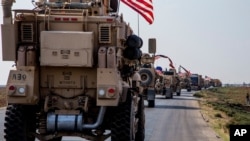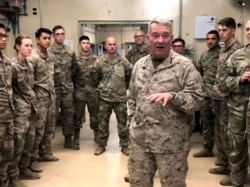U.S.-backed Syrian Democratic Forces (SDF) launched the second phase of a military campaign to destroy remnants of the Islamic State terror group in eastern Syria.
The SDF said its “Deterrence of Terrorism” campaign, which was launched Friday, targets IS militants in the eastern Syrian province of Deir el-Zour.
SDF units, backed by the U.S.-led international coalition against IS, have already captured several IS militants, including a senior leader, and seized large quantities of weapons and ammunitions belonging to IS cells, the group’s media office said Sunday.
In June, SDF forces launched the first phase of their anti-IS operation in the Syrian province, which borders Iraq. At least 100 IS militants were detained in the weeklong operation, SDF and coalition officials said at the time.
Since its territorial defeat in March 2019, IS has carried out terror attacks against civilians and SDF forces, especially in areas along the border with Iraq.
Coalition support
U.S. military officials said IS militants could no longer hide in Deir el-Zour.
“The SDF-led Deterrence of Terrorism operation is essential to clear ISIS operatives from Deir el-Zour and southern Hasakah,” said Col. Myles Caggins, spokesman for the U.S.-led coalition against IS, using another acronym for the terror group.
He said the global coalition is supporting the multiday mission with “advising, intelligence sharing, and occasionally partnered special operations.”
Caggins told VOA that IS sleeper cells in al-Busaryah and al-Shuhail towns of Deir el-Zour have “harmed local leaders and innocent civilians,” adding that “several ISIS lieutenants were captured by the elite antiterrorism commandos.”
Local military officials believe the recent surge in IS attacks in eastern Syria is partially because of a security vacuum created during the coronavirus pandemic. Local authorities in Deir el-Zour and elsewhere in eastern Syria have imposed a lockdown on the region to prevent the spread of the deadly virus.
Steady-state insurgency
Experts believe the militant group now represents a major insurgent threat throughout the Syrian desert, including Deir el-Zour.
This military campaign “might help to disrupt IS attacks to some degree, but I think we are going to be stuck with a ‘steady-state’ IS insurgency in the province at best,” said Aymenn Jawad al-Tamimi, a Syria researcher at Swansea University in the U.K.
He told VOA that any actor controlling Deir el-Zour would face the same security challenges.
“These were the longest-held IS areas,” al-Tamimi explained, adding that “the security in the wider province is divided between two actors where security cooperation is limited.”
The western bank of the Euphrates River, which divides Deir el-Zour, is under the control of the Syrian regime troops and its allied Russian forces and Iranian-backed militias.
US concerned
U.S. military officials have expressed concerns that Syrian and Russian troops in the western part of Deir el-Zour are not capable of stabilizing the region.
“I am concerned because I don’t believe they have any concept of stabilization as we know stabilization,” Gen. Kenneth McKenzie, the commander of U.S. Central Command, told VOA in an interview last week.
McKenzie, who recently visited Syria and met with SDF officials, said Russian and Syrian forces “have no idea how to actually manage that area after you’ve cleared it militarily.”
“The conditions that led to the rise of ISIS still obtain out there in the west… that’s unfortunate, and I am worried about that,” he said.
VOA Pentagon correspondent Carla Babb contributed to this report from Washington.





